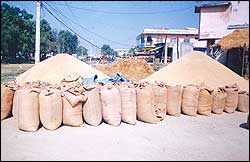 This is the grain basket of Nepal's far-west. Situated on a large island on the Karnali River as it disgorges into the plains, the soil is fertile and yields three crops a year.
This is the grain basket of Nepal's far-west. Situated on a large island on the Karnali River as it disgorges into the plains, the soil is fertile and yields three crops a year. This year's rice harvest has been particularly rich. But the local residents have fled, the entire town and its surrounding are under the sway of the Maoists. Rajapur is right on their main supply route from India into their strongholds in the western hills of Nepal. Whoever controls Rajapur not only controls the food production, but also this strategic route to the border.

Seeing a group of human rights activists and reporters arrive, the operator of the Hotel Chautari at Rajapur breaks into a wide smile. He hasn't seen guests in a long time. There is fear and silence among residents who have dared to remain. No one talks or makes eye-contact with strangers.
Looking at an old man who was behind me when we were approaching Bhimapur, we greeted him. He nodded but did not stop. After introducing myself we inquired if he was a government employee. "I am a retired Subedar from the Indian Army," he said.
When asked how things were going on in his village, he said, "We can't sleep at night, and we don't even feel hunger because of the fear." We stopped to take a photograph of a vacant house belonging to a local landlord, Narayan Upadhyay, but now used as a Maoist "shildter". When we turned around, the ex-subedar had already left.
The ward police office at Rajapur was shifted to the district headquarters at Guleriya seven months ago for security reasons. Since then, Rajapur island has turned into a mini-Rolpa. The Maoists have their own curfew here from 9PM to 6AM. Vehicles can operate only during those hours.
In October, the security forces raided Rajapur, chased the Maoists away and withdrew. The Maoists then returned with a vengeance. They provided two options to over 200 families of security personnel living in the region: either ask their family members to quit their jobs, or leave.
Almost everyone left. Last month, even while the security forces were carrying out a cordon and search operation in Manpur Tapara, Maoists in the nearby Bhimmapur were forcing families of security personnel out. The last Rangabir heard from his sister-in-law was that she had taken her two children and gone to Tikapur. "I haven't heard anything from my brother, Jangbir, after the Maoists burnt down a post office in the area," he said.
Khim Bahadur Nepali, a resident of the nearby village of Godiyana, has also left his house along with his seven family members. Khim Bahadur's son serves at the Nepal Police. Back home, there is no one to harvest his field.
Unlike Rolpa, Rajapur was prosperous and vibrant. Because of the rich harvests, the Japanese helped set up a paddy-threshing plant here. The Maoists destroyed the plant after looting it. To further isolate Rajapur, the Maoists first destroyed a pontoon bridge and then a steamer ferry that transported people and produce between Rajapur and Guleriya. People now have to go via Indian territory or neighbouring Kailali. The army is trying to rebuild the pontoon bridge over the Karnali and resume transport, electricity and telephones.
The security forces have launched a major counter attack from Manpur Tapara to stop the Maoists from looting the grain harvests, and fearing further violence many local Tharus have fled to India and are working as sugacane labourers there. "At least they are safe there, here anyone can come and kill you day or night," said one resident of Durga Nagar after making sure we were neither army nor the Maoists. Security forces have set up their base at Manpur Tapara, and say their intention is to provide a secure environment so locals can come back. But so far, the private schools that were shut down have not opened, and the political activists either keep quiet or have not returned. "How can you engage in political activities where there is no room for arguments?" asked a local UML worker who does not want to be named.
Rajapur native, Gopal Dahit, is now a junior minister in the Chand cabinet. The local Maoists have called him a traitor, even though Dahit used to give fiery speeches here not too long ago calling for Tharu autonomy.


